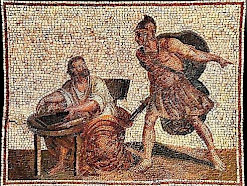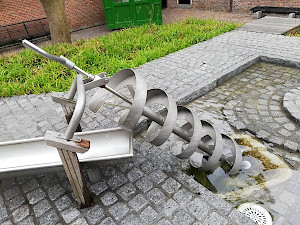Archimedes
Archimedes of Syracuse (287-212): Greek engineer, discoverer of the Law of Archimedes.

One of the most original thinkers of Antiquity was Archimedes of Syracuse. Because our approach to physics is based upon a model that was developed by this scientist, we immediately recognize him as "one of us". And indeed: he did all kinds of hydrostatic experiments and brought the results together in a law of physics, the famous Law of Archimedes ("Any object, wholly or partially immersed in a fluid, is buoyed up by a force equal to the weight of the fluid displaced by the object").
Archimedes was also interested in mathematics, which led to a new approximation of pi and a remarkable treatise, The sand-reckoner, in which he showed that he could command really big numbers by calculating the number of grains of sand in the universe.

Archimedes was also interested in engineering and invented a hydraulic organ and a planetarium (which implies that he thought that the motions of heaven could be described as if they were mechanical). The invention of a machine to lever ships from a dock to the sea made him boast that if he only had a point to stand on, he would move the earth. Archimedes' screw, a machine to bring water upward, was in fact an Egyptian invention, but he offered the mathematical description.
When the Roman general Marcus Claudius Marcellus besieged Syracuse in 212, he invented several war machines. During the sack of the city, Archimedes was killed (text). The famous story that Archimedes was able to destroy ships by using giant burning mirrors, is untrue; his true genius can be seen in the fortifications at Euryalos.
Literature
- E.J. Dijksterhuis, Archimedes (1938)